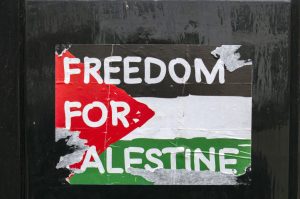On February 2, 2025, large-scale demonstrations erupted in 22 cities across Indonesia, demanding an end to Israel’s attacks on Gaza and its occupation of Palestinian territories. More than 15,000 people from various regions in East Java, organized under the Aliansi Muslim Bela Palestina, gathered in front of Grahadi Building in Surabaya. Other major turnouts were recorded in West Java, Central Java, and South Kalimantan (around 2,000 each) and Yogyakarta (around 1,500)
The protests, organized under the Aliansi Muslim Bela Palestina, began at 6:00 a.m. under the theme “Free Al-Aqsa and Palestine from Zionist Occupation.” While not officially led by Hizb ut-Tahrir Indonesia (HTI), the mobilization patterns and rhetoric suggested the influence of the Islamist group. Protest flyers carried slogans such as “Defend Palestine, Fight Israel.” Protesters also chanted “Free, Free, Free Al-Aqsa! Expel, Expel, the Zionist Occupiers! With, Da’wah, Establish the Caliphate! Takbir… Allahu Akbar!” Some even sang the nasheed “Khilafah Telah Kembali“ (“The Caliphate Has Returned”), reinforcing the ideological undertones of HTI and its movement.
These protests were not isolated incidents but part of a broader strategy on the part of HTI. Since the beginning of the Israel-Hamas war in October 2023, HTI has sought to capitalize on the conflict to advance its ideological goals. Similar mobilizations have occurred globally, reinforcing how Islamist groups, including HTI, use geopolitical crises to strengthen their narratives.
Amid escalating tensions, HTI has framed the Israel-Hamas war as proof of the failure of the nation-state system and the necessity of reinstating the Caliphate. Despite being legally banned in Indonesia in 2017, HTI remains active, mobilizing support through protests, digital propaganda, and social media campaigns. HTI’s communication strategy not only condemns Israel but also targets Muslim leaders whom it deems ineffective in defending Palestine. In 2017, Iffah Ainur Rochmah, a spokesperson for Muslimah Hizb ut-Tahrir Indonesia, argued that “the Palestinian authorities are powerless against Israel’s military superiority because Palestine has not yet achieved true sovereignty” and insisted that “a two-state solution is not the path to victory for Palestinians.” By leveraging public emotion and religious awareness, HTI leaders amplify the claim that secular political systems have failed and that only a global Islamic government can ensure justice for Muslims. This sentiment is reflected in HTI’s rejection of diplomatic solutions and its assertion that only the Caliphate can liberate Palestine.
HTI’s actions align with a broader pattern among Islamist movements. The Gaza war has long served as a propaganda tool for groups seeking to expand their influence. Tricia Bacon, in a 2023 article for the International Centre for Counter-Terrorism, highlighted that the Israel-Hamas conflict has become a recruiting tool for jihadist groups.
At the forefront of this global mobilization is Hizb ut-Tahrir (HT), founded in East Jerusalem in 1953 by Taqi al-Din al-Nabhani. Over the decades, HT has evolved into a transnational movement with tens of thousands of followers worldwide. The group follows a three-stage strategy: recruiting members, Islamizing society, and seizing state power. In Nabhani’s proposed constitution for the future Islamic state, da’wah (Islamic proselytization) should be the core of its foreign policy, with jihad as the primary method of engagement.
In many places, HT has responded to the Gaza conflict by intensifying anti-Israel protests, while simultaneously decrying the failures of the current international order and calling for military intervention in Gaza by Muslim-majority countries. On January 19, 2024, the United Kingdom officially designated HT as a terrorist organization. The U.K. Home Secretary, James Cleverly justified this decision by stating that HT promotes anti-Semitic rhetoric, glorifies acts of terrorism, and incites violence. He specifically cited HT’s support for Hamas’ October 7, 2023, attacks on Israel as a key reason behind the proscription.
Yet, HTI’s claim to be a defender of Islam contradicts political reality, which is that the group selectively uses the Palestine issue as a propaganda tool while showing little concern for other persecuted Muslim communities, such as the Kurds, Darfuris, Yemenis, and Rohingya. Despite having a presence in China’s Xinjiang region, HT has not actively supported the Uyghur Muslims there. This is likely due to its focus on establishing a global Caliphate rather than advocating for specific ethnic or national causes, as well as the Chinese government’s strict ban on HT’s activities.
This inconsistency highlights HT’s ideological contradictions regarding nationalism. While it rejects the concept of nation-states in Muslim-majority countries, it actively supports Palestinian nationalism. Similarly, HT denounces democracy as un-Islamic, yet paradoxically exploits democratic freedoms in Western nations, such as the U.K., to propagate its ideology. Meanwhile, HT is banned in numerous non-democratic Muslim-majority countries due to concerns over its role in fostering political instability.
Ultimately, HT’s selective advocacy suggests that its stance on Palestine is driven more by political strategy than by a genuine commitment to Islamic solidarity.
HTI’s exploitation of the Gaza war has now given it a new issue with which to generate support and shape public opinion. At a December 23 press conference in Jakarta, Indonesia’s National Counterterrorism Agency (BNPT) explicitly identified HTI as among the sources of the 180,954 pieces of extremist, intolerant, and radical content detected throughout 2024. This report confirms that despite its official ban in Indonesia, HTI remains active in the digital space, using online platforms to spread propaganda and recruit new followers.
This not only shapes public opinion but also has far-reaching implications for Indonesia’s foreign policy and domestic stability. The government faces mounting challenges in tackling HTI propaganda without infringing on civil liberties. Societal polarization is deepening, with moderate groups struggling against the growing radical narrative.
Addressing this phenomenon requires a comprehensive strategy. Legal measures, public diplomacy, and stronger counter-narratives must be developed to ensure that support for Palestine remains within the framework of human rights advocacy and international diplomacy – and does not become a vehicle for extremist groups seeking to undermine national security.

































